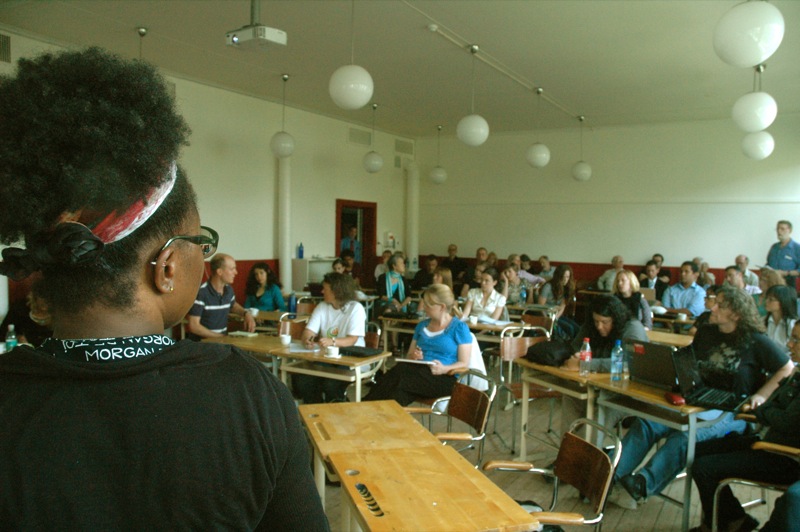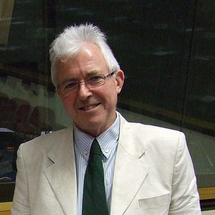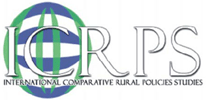by John Bryden 10/02/2014
It is not always easy to perceive who is an ICRPS ‘student’ and who is ‘faculty’. The fact is that faculty come to the summer school in great numbers and regard it as an important means of learning new things, as well as updating themselves on contemporary issues and debates. The students have less choice, but in most cases they have little tangible reward in the form of credits or money, and many have to subsidise their attendance, especially if they come twice. Broadly speaking almost as many faculty come to the summer school as students, although they tend to stay for less time. And we have been very lucky to attract visiting faculty such as the agricultural policy historian Michel Tracy, the rural statistician Ray Bollman, and OECD staffers Nicola Crosta (now with UNCF in New York), Raffaele Trapasso, and Betty-Anne Bryce. In all, we have had between 25 and 35 students and a similar number of faculty at the annual summer schools over the ten year period. And each year we get some second year students, who usually help with the organisation.
Several ICRPS students have become faculty, poachers turned gamekeepers! Others have gone on to work locally, nationally and internationally. Some do all of these things. Many have publicly acknowledged the importance of the ICRPS summer school for their career development and choices. Several have produced doctoral thesis on themes established at a summer school. They are a group to be proud of. Faculty have been tremendously loyal, giving freely of their time (often their summer vacation period) and energy, as well as knowledge and experience. In short, they have been great colleagues!
Learning highlights
 An overarching message is that European and North American societies, reflected in political values, politics and policies, and certainly including several areas of importance in rural regions, differ in several respects. One can add that European societies, despite harmonizing forces in the EU and ETA, are also different one from the other. To understand why policies differ, we have to understand the context in which they are formed and especially political values and systems and the nature of policy making including the role of powerful groups in society, such as the ‘corporations’, ‘farmers unions’, ‘the rich’, the ‘environmental organisations’, ‘economic advisors’, lobbyists and so on.
An overarching message is that European and North American societies, reflected in political values, politics and policies, and certainly including several areas of importance in rural regions, differ in several respects. One can add that European societies, despite harmonizing forces in the EU and ETA, are also different one from the other. To understand why policies differ, we have to understand the context in which they are formed and especially political values and systems and the nature of policy making including the role of powerful groups in society, such as the ‘corporations’, ‘farmers unions’, ‘the rich’, the ‘environmental organisations’, ‘economic advisors’, lobbyists and so on.
Some key fault lines between and within North America and Europe relate to
Polanyi’s question[1]: Basically whether the Market is embedded in Society, or vice versa. Polanyi’s argued that the pure free market system would lead to destruction of both people and nature, as well as the corruption of money. Land people and money were ‘false commodities’, not produced for sale and purchase, and containing important public goods. Regulation was therefore essential for a just and sustainable society. The US is a persistent and powerful example of a nation that does not believe in Polanyi’s answer – they are the most vibrant exponents of the liberal free market, on all sides of the political spectrum. From the US, ‘society’ is within the ‘market’, rather than vice versa. Norway represents the other extreme, and comes closer than anywhere on earth to Polanyi’s ideal with its social democratic consensus-based political regime, strong State regulation of the labour market, land, natural resources and money. For Norwegians in particular, the market is indeed embedded in society. The rest of Europe, with the principal exception of the UK since 1980, and Canada, lie somewhere in between these two extremes, and are more confused about themselves – at least on this question – as a result!
An anecdote from the first study tour during the first ICRPS summer school at Guelph illustrates this fundamental cleavage pretty well. We were on a visit to Lake Huron, and – with our Guelph guide Wayne Caldwell – had discussions with an environmental NGO, local government, farmers and cottagers with holiday homes on the side of the lake. The main issue was water pollution, the cottagers blaming the pig farmers, the farmers blaming the cottagers, and the NGO and local government blaming everyone. The students were asked how they would attempt to solve the problem. Those from the US suggested setting up a surrogate market, with the cottagers buying easements from the farmers which would allow them to control the farm pollution for a payment. Those from Europe argued for a Government regulation to outlaw such pollution whatever its source. Those from Canada argued for an NGO to deal with the issue, with some public funding.
We will not here attempt to discuss how and why this cleavage arose, but part of the story certainly goes back to the Founding Fathers and Jefferson’s failure to control the ‘money interests’ in the development of the US Constitution. These things are very deeply embedded! And they matter!
Another point of cleavage concerns Social Welfare systems and especially the battle between ‘universalist’ and ‘selective’ or means tested systems, but also the relative generosity or otherwise of systems. Once again, Norway and the US represent polar extremes for reasons – once more – that relate to political formation and the nature of democracy. To some extent this is also derivative of different ideas about the role that markets can and should play, and where markets reach their limits. But it is also about different perceptions on how the creation of distinctions based on ‘means’ affects the social system through stigmatization, and whether stigmatization matters or not.
One could go much further in exploring such basic fault lines and their consequences, and this is indeed an important area of enquiry for the future, but in this paper we must stop at this point and hope that discussion on the blog, at the summer institutes, and elsewhere will take the debate forward[2].
[1] Polanyi, K 1944 (2001edition). The Great Transformation: The Political and Economic Origins of Our Time. Boston, Beacon Press (Originally published in New York by Farrar & Reinhart.)
[2] There is some further discussion of them in the papers by Shortall and Warner and by Bryden and Warner, as well as others, in the recent book edited by Mark Shucksmith, David L Brown, Sally Shortall, Jo Vergunst and Mildred E Warner ‘ Rural Transformations and Rural Policies in the US and UK (Routledge 2012)
Photos: Katja Cappelen
 JOHN BRYDEN is one of the ICRPS consortium founders and has a PhD in economic development. Among his merits, he is Professor Emeritus at the University of the Highlands and Islands and Professor of Human Geography Emeritus at the University of Aberdeen, both Scotland. He now lives in Ås, Norway.
JOHN BRYDEN is one of the ICRPS consortium founders and has a PhD in economic development. Among his merits, he is Professor Emeritus at the University of the Highlands and Islands and Professor of Human Geography Emeritus at the University of Aberdeen, both Scotland. He now lives in Ås, Norway.
More on John´s work at www.johnbryden.com
